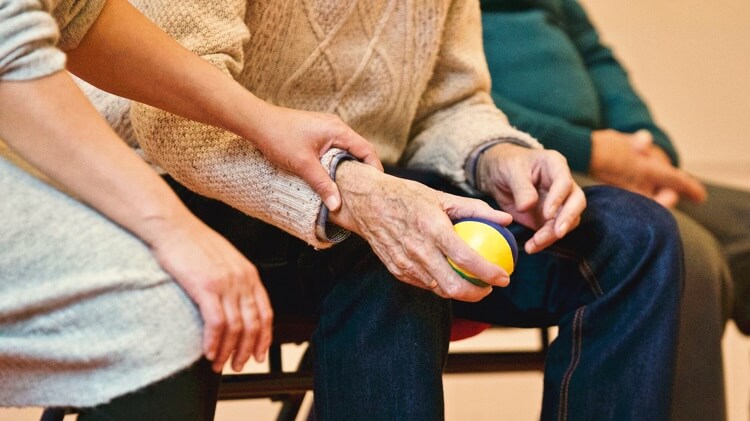Symptoms
Prostate cancer occurs when prostate cells start to grow in an uncontrolled manner. In most cases, prostate cancer is a slow-growing disease, organ-confined, that does not spread out of the prostate before it is diagnosed. Prostate cancer is known as a silent killer due to the fact that the growth of the tumor does not cause any severity on other organs, it does not push against anything to cause pain.
The American Cancer Society estimates that in 2019, only in the US, there will be about 31,000 of deaths caused by prostate cancer. Why such high rates of prostate cancer mortality? Usually, when symptoms appear, the cancer is already advanced. There are cancers that are fast-growing and can metastasize (spread) in other areas of the body. This being the case, the screening process plays an important role in the diagnosis of prostate cancer.

Early signs and symptoms of prostate cancer
The prostate is a small gland that sits under the bladder and in front of the rectum. Due to its proximity to these organs, prostate cancer can cause a variety of urinary problems. It is important to know that urinary problems can also be caused by other non-cancerous prostate conditions, such as prostatitis or BPH (Benign Prostatic Hyperplasia). A prostate tumor may press on the urethra and obstruct the urine flow. When an urethral blockage occurs, it causes several symptoms that men should not ignore.
Urinary urgency – Urinary urgency translates into a strong need to urinate, even if there is little to no flow. A person may find it hard or even impossible to hold the urine back.
Urinary frequency – Frequent urination is the need to urinate more often than usual. Generally, adults go to the bathroom around 4-8 times/day. If you feel a sudden and uncontrolled need to urinate more than 8 times/day without changing your daily habits, the urinary frequency might be a concern.
Difficulty starting or maintaining a stream of urine – Also called urinary hesitancy, the difficulty of starting or maintaining a urine stream may cause swelling or discomfort in your bladder.
A weak or intermittent flow of urine – A weak urine flow leaves a high bladder volume and usually results in frequent urination. Intermittency describes a urinary stream that is not continuous.
Dribbling after urination – After-dribble refers to the involuntary loss of urine immediately after urination. After-dribble happens because the bladder does not empty completely.
Burning or painful urination – Painful urination (Dysuria) is a symptom of discomfort, pain, and burning when urinating. Pain may occur at the start of urination, during urination or after urination. Discomfort after urination is often associated with prostate problems.
Blood in the urine – Blood in the urine (Hematuria) can be gross or microscopic. Gross hematuria can easily be seen in the red-colored urine while microscopic hematuria is found when the doctor tests the urine under a microscope.
Frequent urges to urinate at night – Excessive nighttime urination occurs when you have to wake up during the night to urinate. People who have nocturia (nighttime urination) usually have to wake up more than once/ night to urinate. This causes sleep disorders and severe discomfort.
Painful ejaculation – Painful ejaculation can manifest as pain during or immediately following ejaculation. The pain can be mild or intense and can last only a few minutes or even some hours.
These early signs and symptoms of prostate cancer represent a warning signal and it is advisable for men to get tested for prostate cancer starting at the baseline of 40 years old. Also, it is worth noting that BPH (Benign Prostatic Hyperplasia) or UTI (Urinary Tract Infection) can cause similar symptoms. Only a urologist can determine the underlying cause of your symptoms and provide specific treatment.

Advanced prostate cancer symptoms
At an advanced stage (when the tumor has spread to other organs, lymph nodes or bones), prostate cancer may cause a series of severe symptoms. Usually, prostate cancer is diagnosed before it metastasizes, but there are some rare cases when prostate cancer goes undetected. When cancer grows large enough to press on nearby organs or nerves, it causes some distinctive symptoms.
Chronic pain in your back, pelvis and upper thigh bones – Pain in these areas may be caused by the spread of prostate cancer (metastasis). Bone metastases can cause severe pain and fracture. The pain can be constant or it might come and go. “Approximately 70% to 85% of patients with advanced prostate cancer have associated clinically apparent bone metastases” explain the authors of the study “Pain Management in Patients With Advanced Prostate Cancer.”
Fatigue and a sudden loss of weight – This can happen because cancerous cells consume much of the body’s energy supply. Also, it can cause the immune system to react in a way that causes these symptoms. An unexplained weight loss of 10 pounds or more could be the first sign of cancer.
Nausea (Vomiting) – Nausea represents an urge to vomit, an unpleasant sensation of unease. These problems can be caused by cancer growth. There is specific medicine that treats these problems.
Swelling in the lower extremities – The lymph nodes transport a liquid called lymph that helps to remove waste substances from our bodies. The system may stop working properly as a result of cancer spread. Consequently, the liquid (lymph) builds up under the skin and causes swelling.
Be aware of the signs and symptoms of prostate cancer
The prostate gland is usually neglected and some men do not even know its important function. Only a few men know that the prostate is vital for the proper functioning of the male reproductive system. Sadly, its presence is noticed only when it starts to cause severe problems that may affect one’s quality of life. Men need to be aware of the risk factors that can negatively influence the health of the prostate, along with the symptoms associated with the development of prostate cancer.
If you experience one or more symptoms from those mentioned above, do not hesitate and schedule an appointment with a urologist. Most cancers detected at an early stage are curable and do not cause life-threatening issues.
Your life is more precious than your fears. Get in touch with an experienced urologist if you’re having any of the signs presented above.
Bibliography
- Symptomatic Diagnosis of Prostate Cancer, PubMed Abstract, Web, 1 Aug 2004
- Symptoms of Prostate Cancer, Cancer Research Uk, Web
- Prostate Cancer Early-detection, Cancer Council, Web, 6 Sep 2019

